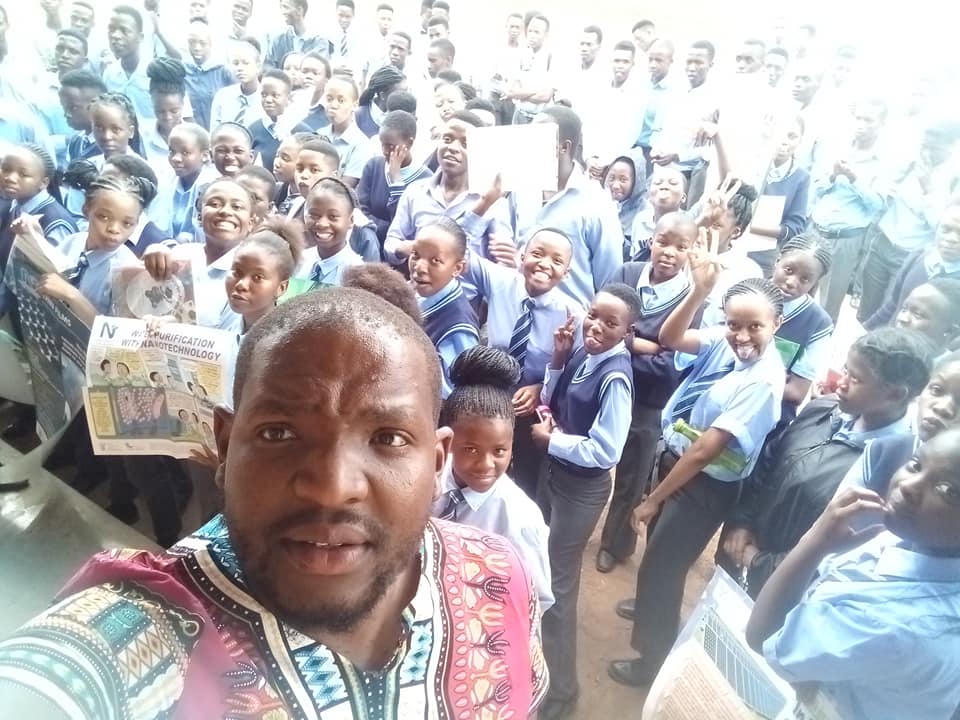Science for Ubuntu: The South African organisation humanising science
Science for Ubuntu’s founder, Maboni Mmatli, is passionate about making science accessible to everyone, particularly in South Africa. He explains why science need not be ‘difficult’ or for the ‘elite’ few
For Maboni, science is not about gaining academic fame or financial gain; if science is applied with ‘ubuntu’, then it is people and communities that will benefit. For example, in an institution where the neighbouring community experiences food scarcity and malnutrition, major research funds and interests should be devoted to finding residential resources and strategies that promote and advance sustainable solutions to these challenges. “Poverty is de-humanising and I strongly believe that when residents in poor communities are empowered to use science to solve their everyday problems, then they can regain their dignity and achieve a better quality of life for themselves. I also believe that when coached, they can come up with the most amazing innovations imaginable.” Maboni tells us more:
HOW DOES SCIENCE FOR UBUNTU CONNECT WITH COMMUNITIES?
1. Thousands of copies of the Science for Ubuntu newspaper are distributed each month on a subscription basis, and community ambassadors liaise between the organisation and its audience. The newspaper includes inspirational success stories, topical articles, puzzles and quizzes to keep the reader on their toes. Most significantly, much of the newspaper, and its scientific content, is translated into four indigenous languages for the varied audience it reaches. Some of Science for Ubuntu’s readership struggle with comprehension, but partnerships with literacy-advocating community-based organisations (CBOs) do a great job of curbing the barrier.
2. Science for Ubuntu’s science tours visit underprivileged rural and township public schools. The tours are sponsored by the South African Agency of Science and Technology Advancement (SAASTA) but purposefully target those areas that the SAASTA has a minimal presence in. To maximise its impact, Science for Ubuntu partners with CBOs and forms school-based science clubs to keep the learners engaged after its departure. (Check out this video: https://youtu.be/42zEfnZdl9o.) I see students ‘light up with joy and excitement’ when they access these science tours! For some students, the Science for Ubuntu event means they are experiencing a hands-on approach to science and engaging with scientific material outside of their school-prescribed textbooks for the first time. Starting with singing and dancing, these days lead on to science talks and challenges. When students see that we are impressed by their proposed solutions, they start talking about what happens when we leave, which leads to them forming science clubs themselves.
3. Science for Ubuntu uses Facebook and YouTube to share posts and videos but not everyone in the communities they are trying to reach has access to digital media. To combat this challenge, Science for Ubuntu forms partnerships with local community radio stations, promoting its science initiatives through the airwaves.
 MABONI MMATLI
MABONI MMATLI Founder of Science for Ubuntu
Maboni is passionately optimistic about science as a force for good. For him, it is the people involved in all aspects of science, from researchers to policymakers to end-users, who are central to development.
Science for Ubuntu takes its name from the South African Nguni word ‘ubuntu’, meaning ‘the quality of being human’.
WHAT ADVICE WOULD YOU GIVE TO CLASSROOM TEACHERS WHO WANT TO ENGAGE THEIR STUDENTS IN THEIR SCIENCE STUDIES?
Teachers’ experiences are different around the world. However, I strongly encourage a platform of equality and a safe space of comfort for error making and asking ‘obvious’ or ‘silly’ questions. Teachers need to drive engagement through interactive and unconventional methods of teaching – we often use games and treasure hunts. We always let the learners drive the topic of engagement. We provide a platform for learners to have fun; we offer information and correct them when they make mistakes.
HOW HAS SCIENCE FOR UBUNTU IMPACTED ON INDIVIDUALS?
We hosted a workshop for township learners that culminated in a mock science fair – learners were taught how to devise a scientific project and how to communicate their ideas. One of the learners who took part went on to use these newly acquired skills when they secured a slot at the international Eskom Expo for Young Scientists fair!
A female student from a township we visited is currently pursuing a degree in aircraft engineering. We learnt about this after she contacted us to say thank you for visiting her school and for the career profiling we conducted.
WHAT ROLE DO YOU SEE SOUTH AFRICA PLAYING IN SCIENTIFIC DEVELOPMENT IN THE FUTURE?
South Africa is a country pregnant with endless and overdue possibilities. All that is needed is proper stimulation in the form of R&D funding to induce the delivery. Our large biodiversity, high youth population and internalised spirit of Ubuntu can offer the world ground-breaking developments in the sectors of medicine, engineering and technology that solves challenges first, and drives profit later.



